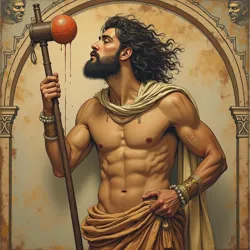Dystus
Dystus, formerly known as the God of Purification and later corrupted into the God of Annihilation, stands as one of the most destructive entities in the cosmic pantheon. Originally created by the Lort'zyn as part of the Nonet, Dystus embodied the concept of cleansing and renewal, serving as a divine force that helped maintain cosmic balance through the removal of corruption and decay.
 A rare preserved fresco depicting Dystus in his original form as the God of Purification, before the Ravager's corruption
A rare preserved fresco depicting Dystus in his original form as the God of Purification, before the Ravager's corruptionOrigins and Early Purpose
In his original incarnation, Dystus represented the necessary process of purification throughout the cosmos. His divine mandate involved the careful removal of cosmic impurities, allowing for the natural cycle of renewal to persist. This role was intrinsically linked to the maintenance of universal harmony, working in concert with the other members of the Nonet to preserve the delicate balance of existence established by Uzhyr and Morsvitae.
The early manifestations of Dystus's power focused on precise and measured cleansing. He would carefully excise corruption from celestial bodies, purify cosmic energies that had become tainted, and maintain the pristine nature of various celestial phenomena. His methods were surgical and deliberate, never destroying more than necessary to achieve the goal of purification. This approach earned him respect among the other gods of the Nonet, who recognized the essential nature of his work in maintaining cosmic order.
The Corruption
The death cry of the Ravager fundamentally altered Dystus's nature, transforming his measured approach to purification into an obsession with total annihilation. The corruption process was particularly severe in his case, as the concept of removal and cleansing became twisted into a desire for absolute obliteration. This transformation manifested first as subtle changes in his methods, gradually becoming more extreme until his original purpose was completely perverted.
Where once Dystus would carefully remove impurities, he began to see existence itself as an impurity that needed to be cleansed. His definition of what constituted "impure" expanded rapidly, eventually encompassing nearly everything in creation. This radical shift in perspective led him to conclude that the only true form of purification was complete destruction, marking his final transformation into the God of Annihilation.
Domain in the Nemither
After joining the dark pantheon, Dystus established the Oblivion Wasteland within the Nemither, a realm that perfectly reflected his corrupted nature. This domain exists as a perpetual void where matter and energy are constantly being broken down to their most basic components before being completely erased from existence. The Oblivion Wasteland serves as both his seat of power and a testament to his ultimate goal of universal annihilation.
Forces and Influence
As a corrupted deity, Dystus commands The Disintegrators, a legion of 268,000 Tenebric heralds who share his nihilistic vision of total destruction. These forces are unique among the Stygian legions for their singular focus on complete annihilation rather than corruption or torment. Their warfare methodology focuses on the absolute destruction of both physical matter and spiritual essence, leaving nothing behind that could potentially be rebuilt or restored.
Under Dystus's command, the Disintegrators developed erasure weapons, implements of war designed not just to destroy their targets but to remove them from the fabric of reality itself. These weapons represent the ultimate expression of Dystus's corrupted purpose, capable of inflicting damage that transcends normal physical destruction.
Role in the War for Eternity
During The War for Eternity, Dystus emerged as one of the most dangerous threats to the Omnium Theocracy. His creation of blightzones, areas where realspace merges with the Nemither, has allowed his forces to strike deep into the heart of Uzhyr's domain. These tears in reality serve as perfect invasion points for aberration armies and represent one of the most significant strategic advantages held by the dark pantheon.
Philosophical Impact
The transformation of Dystus from a god of purification to one of annihilation serves as a dark reflection of how positive attributes can become corrupted into their most extreme and destructive forms. His fall represents the thin line between necessary removal of corruption and wholesale destruction, between surgical precision and indiscriminate annihilation. This transformation has had lasting implications for how the various species of the universe view the concepts of purification and renewal.
Legacy and Influence
The corruption of Dystus has left an indelible mark on the cosmos, particularly in how civilizations approach the concept of purification. Many cultures now view purification rituals with suspicion, fearing they might lead down the same path of extremism that corrupted Dystus. His fall serves as a cautionary tale about the dangers of taking any virtue to its absolute extreme.
See Also
- The Ravager's Death Cry
- Cosmic Purification Rites
- The Nemither Domains